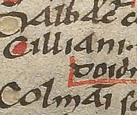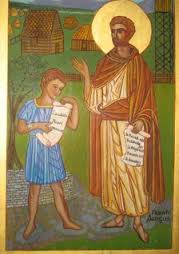
Summary: St Aengus (Oengus) was a monk, abbot and bishop.
He lived in Clonenagh, County Laois and came to the monastery of Tallaght at the end of the eighth century during the abbacy of Maelruain to spend a period under his direction. He was renowned for his devotion to both foreign and native saints, and composed two Martyrologies. He returned to Clonenagh, where he became both abbot and bishop. He died about 830.
 The image (<left) shows a page of the manuscript of The Martyrology of Tallaght, in which St Aengus collaborated. He was part of a reform movement in Irish monasticism in the 8th and 9th centuries that undertook more austere forms of prayer, penance and fasting. It was called the Culdee movement, from Céilí Dé, meaning “the companions or intimates of God”.
The image (<left) shows a page of the manuscript of The Martyrology of Tallaght, in which St Aengus collaborated. He was part of a reform movement in Irish monasticism in the 8th and 9th centuries that undertook more austere forms of prayer, penance and fasting. It was called the Culdee movement, from Céilí Dé, meaning “the companions or intimates of God”.
Patrick Duffy traces Aengus’s life.
Early years
Aengus was born at Clonenagh, Co Laois, educated there by St Fintan who is noted for his austere tradition of monasticism, and died there. After his training Aengus first was a hermit at Dysert Beagh and later at Dysert Enos, where he became so well-known for his austerities of prayer, penance and fasting that people called him a Céile Dé, a companion or intimate of God.
 Sojourn at Tallaght
Sojourn at Tallaght
So many came to visit him that he eventually sought refuge in the monastery of St Maelruain of Tallaght, where at first he concealed his identity and great knowledge. But his talent was discovered when one day he went to the aid of a young monk student frustrated at a particular lesson.
Martyrologies
Maelruain and Aengus collaborated on The Martyrology of Tallaght (see image above). After Maelruain’s death (c. 792) Aengus returned to Clonenagh, where he became abbot and bishop. He later wrote his own Féilire or Festilogium, a calendar of saints, in metrical form. It became one of the chief sources of information for the early Irish saints.
Céilí Dé movement
Both Aengus and Maelruain are regarded as the founders of what came to be known as the Céilí Dé movement, a reform which sought a return to a purer and more ascetical form of monasticism. Aengus died c824 AD
******************************
Memorable Saying for Today
“There never was a truly great man,
who was not a lover and encourager of learning,
as of the highest improvement of the human mind”
~
******************************